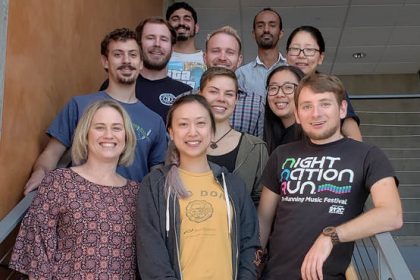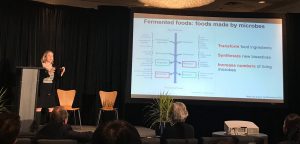
The gut microbiome is pivotal to human health, and the biggest aid to nourishing a healthy microbiome is our diet.
“The tools of our diet…are a really valuable resource for our microbiome,” says Maria Marco, professor in the UC Davis Department of Food Science and Technology. “They’re noninvasive, easy to use, low cost. We can improve our microbiome using specific ingredients, targeting microorganisms, using foods like living fermented foods or probiotics to directly contribute to our microbiome.”
Marco, a speaker at Natural Products Expo West, shared insight from her research at UC Davis’ Marco Lab, where Marco and a team of students study microorganisms impact on food safety, food quality and gut health. Their cutting-edge research is scratching the surface of the complex microbiome.
Microbiome research has transformed in the past 10-15 years. Marco says scientists had relied on 19th Century microbiology of the prior hundred years. New advancements in chemistry, engineering, data science and DNA sequencing “revealed this hidden world.”
“We’re riding a wave right now. We’re appreciating more than ever before that we are living in microbial world,” Marco said. “The magnitude of what these microorganisms can be doing…is tremendous.”
Our bodies are only 1 percent human – the rest of our body structure is made of trillions of microorganisms. Every human carries about 1 kilogram of their bodyweight in microbial biomass.
Marco said for years we’ve thought of the intestines as an empty tube, but these microorganisms reside in our digestive tract. The microbiome performs critical functions, like digestion, detoxification of food, synthesis of vitamin and development of immune system and brain.
But our microbes may not always aid our body. The beneficial organisms that create a rich microbiome have changed over human history because of the prevalent use of antibiotics, and changes to diet, hygiene and lifestyle.
There are only a few ways to improve the microbiome, Marco says – drugs, fecal transplants or diet. Marco said the best way to achieve a healthy microbiota is through the diet, by eating the microorganisms our gut needs.
The diet, she says, needs to be full of fermentable fiber. Humans eat diet-associated microbes in prebiotics and probiotics.

One study from Marco Lab found that, when adults added fermentable fiber to their diet, the microbes thrived off these nutrients, and the good bifidobacteria thrived. The microbiome was significantly altered.
“How do we get microorganisms? First of all, just by eating fresh foods and vegetables,” Marco says. The second is eating “fermented foods (which give us) exposure to a higher number of these organisms. They hey have to be foods where the microbes are still alive, such as in yogurt or fresh sauerkraut. And then lastly, we can have probiotics, organisms that we either take in supplements or put into foods in an even higher number so were getting an even higher doses of these organisms over time.”
There are specific bacteria strains found in fresh fermented foods, and some are sold today as strains in probiotic supplements. Thousands of clinical studies show probiotics are beneficial to digestive health – but today, microbiologists are seeing probiotics aid other areas of the body, like vaginal health and neurocognitive function.
“As we study these organisms, we’re really guided by a couple questions, practical questions that need to be answered in order to take probiotics to the next level of where we need to have them in our food and medicine,” Marco said. Like what strain should be used, what dose taken and how long should it be used. “We don’t really have answers to this and it’s really hard as a consumer to know which to use.”
Marco Lab studied 42 strains of lactobacillus bacteria, and found each strain has different properties. “The breadth of what we saw was really outstanding,” Marco said.
The future of the field of research is knowing the individual properties of these strains, Marco said. Like can a certain strain alter our mood, another prevent obesity and another support our immune system? The strains are so complex, “we’re starting to get a handle on what specific things they’re doing.”
Safety of the strains is critical. Marco noted the next generation of probiotics need food safety standards. These are organisms that are not found in foods, and Marco said “the bar needs to be quite high.”
“More studying needs to be done. In the microbiome world, we’re really at the starting stages,” Marco says. “But we need the right science so we know if we’re giving the right organisms to the right people at the right time.
